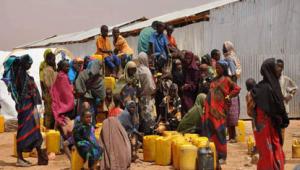768x424-Downtown-lagos-nigeria-iStock_000048812356_Full.jpg

Lagos, Nigeria
An estimated 187 million more people are expected to flock to the continent’s cities by 2025, but without better international links, foreign investment and better efficiency, the bank warned Africa risks missing the dividends of urban development.
Africa’s rapid urbanisation has not been accompanied with the economic growth enjoyed by other regions. East Asia and the Pacific, for example, reached 40% urbanisation with a GDP per capita of $3,600. Today, at the same levels of urbanisation, Africa has a GDP per capita worth just $1,000.
The bank’s report highlighted the continent’s “urban form” – locally focused city economies, with poor organisation and connectivity and relatively high costs of living and doing business – as a key impediment.
“Such cities inspire low expectations for the scale of urban production and for returns on invested capital,” the report said, arguing cities need to become “economically dense” rather than “merely crowded”.
Currently, it argued that African cities remain “local cities” – closed to regional and global markets and trapped producing only locally traded goods and services, as opposed to the exports, limiting their growth.
It highlighted two reasons for this: growth in the natural resource sector, which has crowded out other key sectors like manufacturing and creating high demand for non-tradable goods and services; and how African cities are organised.
Capital investment, infrastructure, industry and commercial facilities and housing in African cities have not kept pace with the growing number of people, and as a result African cities are 29% more expensive than cities in countries relative to income levels.
Africa’s city dwellers pay more for their homes, food, services and transport than those in low- and middle-income countries elsewhere.
This can limit their opportunities and quality of life. In Abidjan, Ivory Coast, 50% of city residents live at least three people to a room. In Nairobi, the number of informal settlements in the centre of the city and close to jobs is constantly growing. The inability to pay for a commute leaves many stuck walking to work, shrinking their job pool.
At the same time, employers have to pay higher wages to cover their staffs’ costs. The bank said this makes businesses less productive and competitive, keeping them out of tradable sectors and meaning they are avoided by potential regional and global investors and trading partners.
Even if African cities worked to build up their key exporting sectors like manufacturing, the bank warned these issues with “urban form” could hold them back.
The report urged African leaders to formalise their cities’ land markets, clarify property rights and ensure effective urban planning as a priority.
They should also focus on making “early and coordinated” infrastructure investments, which provide connections between housing, infrastructure and commercial and industrial developments.
“What cities do now will determine their shape and efficiency not just for years to come, but for decades or even centuries,” said Ede Ijjasz-Vasquez, senior director of the bank’s social, urban rural and resilience global practice.
“From a policy standpoint, the answer is to address the structural problems affecting African cities. Fragmented physical development – cities in Africa are 20% more fragmented than Asian and Latin American ones – is limiting productivity and liveability.”
The bank’s lead urban economist and author of the report, Somik Lall added: “African cities need to create an internationally competitive tradable sector in order to stay open for business.
“Without this they will remain local cities, closed to regional and global markets, trapped in producing only locally traded goods and services, and limited in their economic expansion.”













